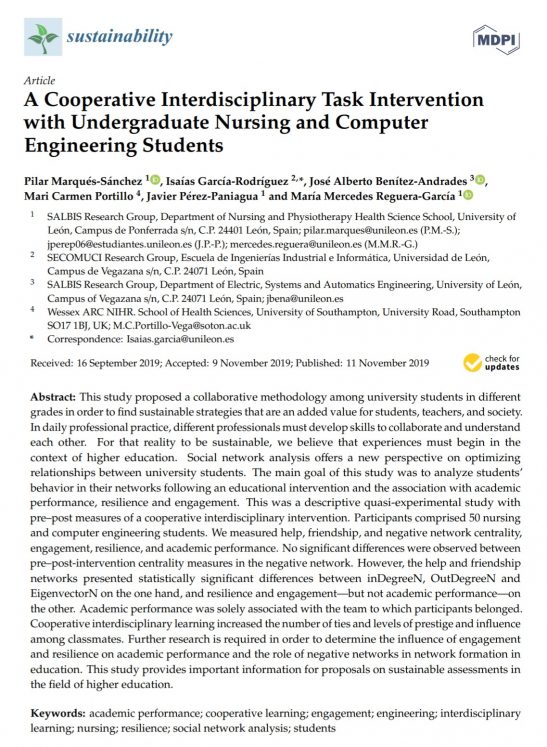Sustainability 2019, 11(22), 6325; https://doi.org/10.3390/su11226325
Article
A Cooperative Interdisciplinary Task Intervention with Undergraduate Nursing and Computer Engineering Students
1 SALBIS Research Group, Department of Nursing and Physiotherapy Health Science School, University of León, Campus de Ponferrada s/n, C.P. 24401 León, Spain
2 SECOMUCI Research Group, Escuela de Ingenierías Industrial e Informática, Universidad de León, Campus de Vegazana s/n, C.P. 24071 León, Spain
3 SALBIS Research Group, Department of Electric, Systems and Automatics Engineering, University of León, Campus of Vegazana s/n, C.P. 24071 León, Spain
4 Wessex ARC NIHR. School of Health Sciences, University of Southampton, University Road, Southampton SO17 1BJ, UK
* Author to whom correspondence should be addressed.
Received: 16 September 2019 / Accepted: 9 November 2019 / Published: 11 November 2019
Abstract:
This study proposed a collaborative methodology among university students in different grades in order to find sustainable strategies that are an added value for students, teachers, and society. In daily professional practice, different professionals must develop skills to collaborate and understand each other. For that reality to be sustainable, we believe that experiences must begin in the context of higher education. Social network analysis offers a new perspective on optimizing relationships between university students. The main goal of this study was to analyze students’ behavior in their networks following an educational intervention and the association with academic performance, resilience and engagement. This was a descriptive quasi-experimental study with pre–post measures of a cooperative interdisciplinary intervention. Participants comprised 50 nursing and computer engineering students. We measured help, friendship, and negative network centrality, engagement, resilience, and academic performance. No significant differences were observed between pre–post-intervention centrality measures in the negative network. However, the help and friendship networks presented statistically significant differences between inDegreeN, OutDegreeN and EigenvectorN on the one hand, and resilience and engagement—but not academic performance—on the other. Academic performance was solely associated with the team to which participants belonged. Cooperative interdisciplinary learning increased the number of ties and levels of prestige and influence among classmates. Further research is required in order to determine the influence of engagement and resilience on academic performance and the role of negative networks in network formation in education. This study provides important information for proposals on sustainable assessments in the field of higher education.
Keywords: academic performance; cooperative learning; engagement; engineering; interdisciplinary learning; nursing; resilience; social network analysis; students

